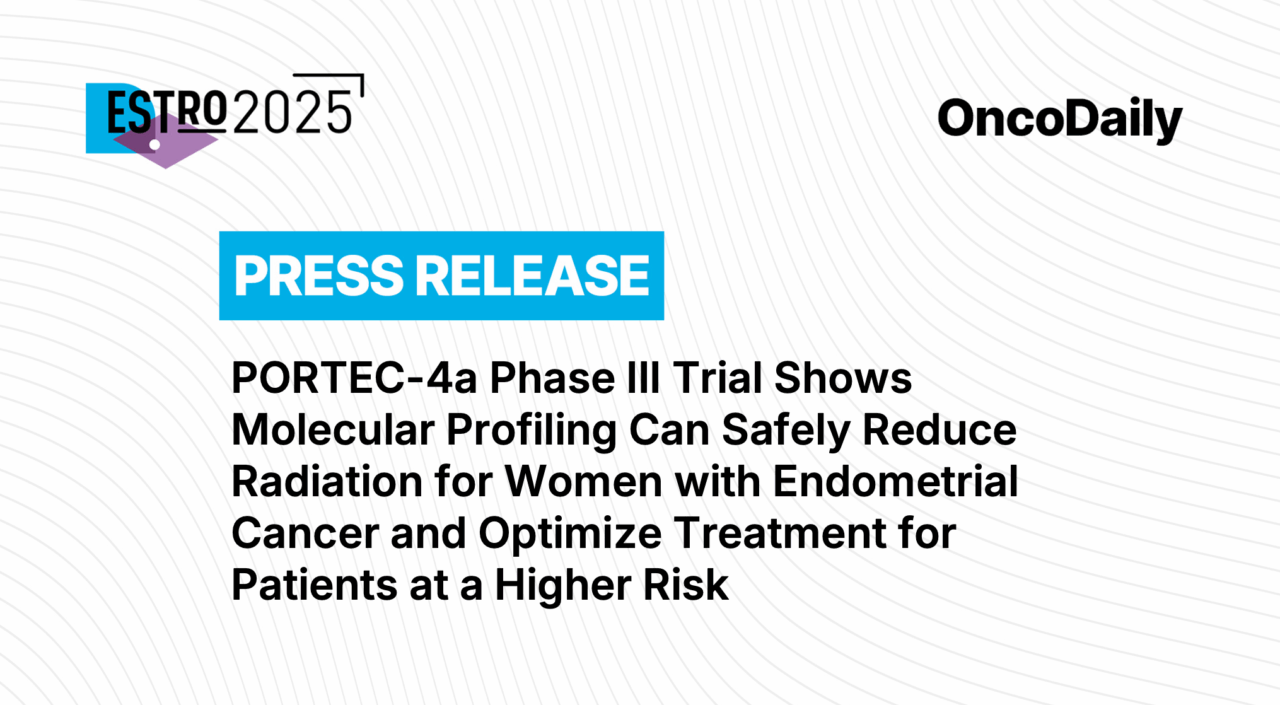Vienna, Austria — A major international clinical trial, PORTEC-4a, has demonstrated that molecular profiling can safely reduce the use of radiotherapy for women with early-stage endometrial cancer, while identifying those who may benefit from more intensive treatment. The findings, presented at ESTRO 2025, mark a major milestone in the advancement of personalised cancer care, offering a more precise and less invasive approach to treatment.
Endometrial cancer is the most common gynecological cancer in high-income countries, typically affecting postmenopausal women. Most cases are diagnosed at an early stage, where outcomes are generally favourable. For women with high-intermediate risk disease, adjuvant radiotherapy—especially vaginal brachytherapy (a form of internal radiotherapy delivered to the vaginal area)—is commonly used after surgery to reduce the risk of recurrence. However, not all patients benefit equally, with some receiving unnecessary treatment and others potentially being undertreated.
The PORTEC-4a trial explored whether molecular profiling—a technique that examines genetic and biological features of a tumour—could guide clinicians in making more tailored radiotherapy decisions. The results confirm that this approach not only helps identify patients who can safely avoid radiotherapy but also ensures those at higher risk receive more appropriate, intensified treatment.
Key Findings:
-
The randomised trial enrolled 592 women across eight European countries, all with high-intermediate risk endometrial cancer.
-
Molecular profiling was used to classify tumours into distinct risk categories.
-
In the molecular-profile-guided treatment arm:
-
46% of patients safely avoided radiotherapy altogether.
-
Patients with unfavourable molecular profiles were offered pelvic radiotherapy instead of standard vaginal brachytherapy.
-
These patients had a significantly lower locoregional recurrence rate of 8.4%, compared to 30.5% among similar patients receiving standard care without molecular guidance.
-
“Using molecular profiling allows treatment to be tailored to each patient’s individual risk. This approach may help reduce the use of radiotherapy for some patients while ensuring that those who need it receive appropriate therapy. It represents a step toward more personalized and potentially less invasive cancer treatment.”
Why This Matters:
The incidence of endometrial cancer is rising globally, and the need to optimise treatment without compromising outcomes is more urgent than ever. The PORTEC-4a trial builds on previous PORTEC studies, which have helped shape modern endometrial cancer care. The latest findings show:
-
Reduced overtreatment: Nearly half of the women in the trial were spared radiation without affecting cancer control.
-
Improved targeting: Molecular profiling ensured that patients with high-risk features received more effective treatment.
-
Better outcomes: A more intensive approach for high-risk patients improved local tumour control, a key factor in long-term survival.
A Step Forward in Precision Oncology
“The PORTEC-4a trial is considered a significant development in cancer research. It highlights how precision medicine can help tailor radiotherapy to patients most likely to benefit, potentially improving outcomes, preserving quality of life for many women, and maintaining effective cancer control.”
As clinical adoption of molecular profiling expands, the PORTEC-4a trial lays the foundation for a new standard of care in endometrial cancer: one that is individualised, evidence-based, and focused on both outcomes and patient well-being.
About ESTRO 2025
ESTRO 2025 brings together around 7,000 participants from over 80 countries, showcasing the latest research in clinical radiation oncology, radiobiology, medical physics, technology, and brachytherapy. Leading doctors and scientists from around the world present groundbreaking findings, in line with the conference theme: “Transformative innovation through collaboration”. ESTRO 2025 is the annual congress of the European Society for Radiotherapy and Oncology (ESTRO), an organisation dedicated to advancing cancer treatment through radiotherapy and multimodal approaches. ESTRO promotes education, science, and research and advocates for universal access to radiotherapy. With nearly 10,000 members worldwide, it supports radiation oncology professionals and the broader oncology community in their daily practice.
Read ESTRO 2025 Updates on OncoDaily



